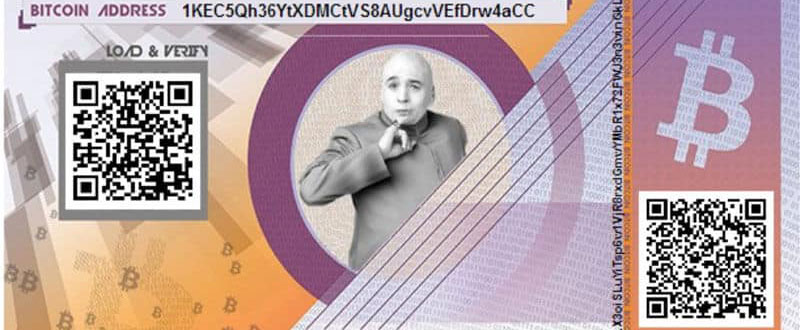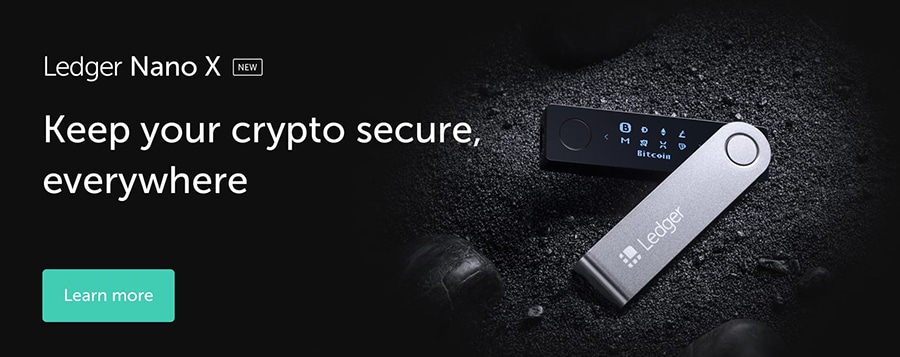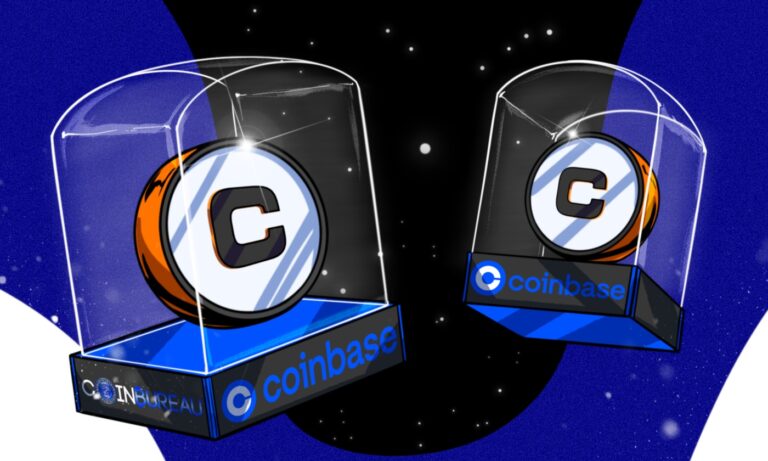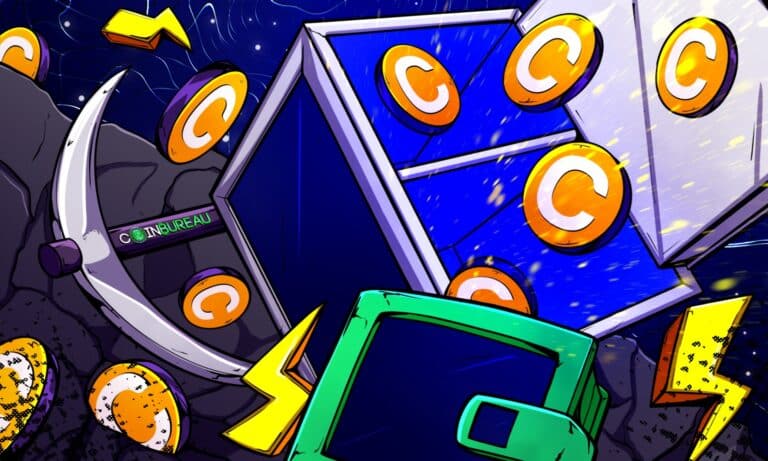Hardware wallets have always been the best way to secure your crypto, something that became even more evident after the disastrous events of 2022 that saw customers lose access to billions of dollars after the FTX, Celsius, BlockFi and Vault fiascos. Hardware wallet companies like Ledger and Trezor saw record sales that year as crypto holders fled to the safety of hardware wallets. If you are on the search for a safe way to store your crypto, you have done well to find this article. I hope you find our best hardware wallet picks helpful.
Page Contents 👉
Not your keys…
Imagine this scenario:
Your crypto portfolio is coming along nicely. That BTC you bought a couple of years ago sits slowly powering up its thrusters for another moon shot. You have a healthy amount of ETH, ready for it to become the future of web3. Maybe you have a stack of Altcoins that you plan on going all pirate-like with and burying someplace safe for the next decade. You log into your exchange account every so often to see how it’s all doing and ponder your next move, pondering perhaps what the best crypto wallet is.
If you have a few hundred dollars locked up in your portfolio and it’s all kept on a reputable exchange then maybe you don't have too much to worry about, or maybe you do, look at how many users were caught off guard by the FTX collapse. If you are keeping it on an exchange, at least be sure to have all the extra two-factor authentication options enabled and have set up anti-phishing emails if your exchange offers that feature.
The best exchanges have good security procedures in place to protect against hacks and unauthorized withdrawals and spend a lot of money every year on maintaining them, making hacks unlikely. In the unlikely event that the worst does happen, it’s not as though you’ve lost the family silver, though some crypto enthusiasts might be thinking, “psssh, forget the family heirlooms, losing the family Bitcoin is worse!”
Unlikely, yes. Impossible, no. Exchange hacks have happened before, with catastrophic consequences. Many grizzled crypto veterans still shudder to remember the Mt. Gox fiasco, while the BitGrail saga still resonates throughout the space, while more recent events like the KuCoin hack and FTX collapse leave you wondering how anyone can trust their funds on any centralized platform.

Not your Keys, Not your Crypto. Image via Shutterstock
In successful hack cases, hackers made off with millions of dollars in crypto and investors were left staring in dumb horror at their computer screens. Then the insolvency and bankruptcy of Celsius, BlockFi and FTX caused millions of users to simply lose access to their funds overnight. These are the worst examples, but lessons have been learnt and security tightened, and the threats remain.
There are plenty of exchanges out there that are either downright shady, or else don’t invest enough in their security, or are simply poorly run. But it’s worth remembering that, if you store your coins on an exchange – no matter how well-regarded and secure it may be – you do not control them. The private keys to your crypto are held by the exchange and if something goes wrong there is little or nothing you can do about it.
For Guy's take on the best hardware wallets, be sure to check out his video on his top five secure hardware wallet picks in 2022:
…Not Your Crypto
The best exchanges make security one of their top priorities. Most insist that users complete KYC (know your customer) procedures when registering. Two-factor authentication is usually required to log in and withdrawals are frequently limited to specific, whitelisted wallet addresses.
Any exchange worth considering will keep most of its funds in cold storage, without access to the internet. The drives with all the users’ private keys are then sometimes stored in secure vaults with air gaps and armed guards. The private keys containing access to the digital gold is treated as securely as though it were the real solid shiny stuff. The top exchanges also have insurance which means that if a breach does occur, any investors affected will be reimbursed.
You can rest assured though that the hackers won’t have given up. There’s too much money to be made (or stolen) and in some cases, the hackers have some pretty powerful interests behind them. Technology is advancing all the time with the newest, shiniest padlocks ending up looking rusty.
And quite aside from the threat of theft is the question of ownership. You’ve paid for your crypto, you will decide what to do with it, so you should have the keys to it. In these matters it pays to listen to experience and those who have been knocking about the crypto ranges for a while will tell you that keeping your coins on an exchange is a bad idea.
Hardware Wallets: Take Ownership of Your Crypto
Once you’ve decided to forgo keeping your coins on whichever exchange you might be using, you have three main options. The first is to store them on a mobile wallet – basically, an app for your smartphone, check out Guy's top picks for the top mobile wallets.
These mobile wallets give you more control over your crypto and allow you greater freedom to use it to pay for goods and services. They do of course have one major downside, which you will probably have spotted: they’re still connected to the internet and therefore still vulnerable to attack.
The second option – and the one most likely to appeal to anyone born before about 1970 – is a paper wallet. Yes, paper… I seem to remember it now. Here you print out your private keys (usually in the form of a QR code) and keep them somewhere safe. There are benefits to doing it this way, of course. If you intend to hodl your coins for years to come then putting the keys in a drawer and forgetting all about them will stop you ever spending or selling them.
As long as the piece of paper is kept safe and not lost or stolen, or put in the recycling by a well-meaning partner who has finally lost patience with you for not clearing out the study, then all should be well.
The third option is the one which concerns us today and is by far the best for those who hold a decent amount of crypto and want to keep it safe. Whether you’re a minnow or a whale or somewhere in between (a barracuda?) then a hardware wallet is what you should be using to store those coins, hence why we put together this article on the best crypto wallets to help you figure out which is the best choice for you.
Hardware wallets are physical devices with a secure element that stores your private keys in a secure manner and keeps them safe from any outside attack. They can be plugged into a computer, or connected to a mobile device to enable users to manage and spend their crypto, but all aspects of any transactions and validations are done on the device itself. Even if the device being used is infected with malware or is otherwise compromised, the hardware wallet remains secure and nobody else can get access to the private keys.
Each of the wallets mentioned here today comes with the vitally important feature of being able to back up your wallet so you will be able to restore your wallet, and your funds, should you lose or damage the wallet that stores your private keys so please follow good crypto security etiquette 101 and always ALWAYS be sure to back up any wallet you use, software or hardware. Keeping those recovery seed phrases stored safely will likely be the only way to recover your funds should something go astray with your crypto storage method of choice.
I highly recommend checking out our article on How to Keep Your Crypto Safe for a comprehensive article on all the best practices and steps you can take to ensure you are using crypto in the safest and most secure manner possible.
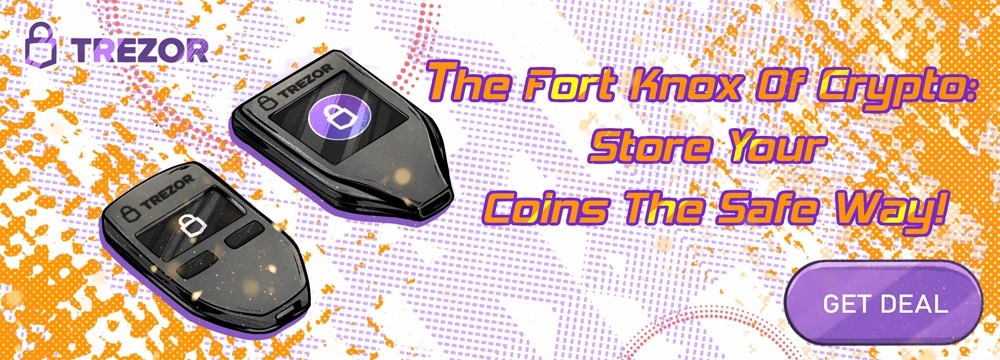
Top 5 Best Hardware Wallets for Cold Storage Solutions
There are a number of hardware wallets on the market and choosing the right one can be tricky. That’s why we’ve put together a handy guide to our top five below. There are a few things to weigh up before choosing which one is right for you and we’ll consider all of these in relation to each wallet:
- Security: Although hardware wallets are the safest option out there, some are more secure than others.
- Coins supported: All hardware wallets will store BTC, ETH and most other top cryptocurrencies. However, if your portfolio includes some lesser-known altcoins, then some wallets may not be suitable.
- Price: If your portfolio is relatively small then chances are you won’t want to pay top dollar for a device to store it on. As with any product, prices for hardware wallets vary.
One final point to remember when buying a hardware wallet is to always buy it directly from the maker. There have been a few instances of unscrupulous types buying a wallet, extracting the seed words and then reselling the device. When the unsuspecting buyer then loaded their crypto onto it, the scumbags were able to remove their funds using these seed words.
Avoid buying your wallet from eBay or anywhere else where it might have been interfered with and order straight from the supplier’s website. Most of them also offer free shipping, unless you happen to live somewhere particularly exotic.
So, armed with this knowledge, let’s take a look at the best hardware wallets on the market.
If you are interested in mobile or software wallets you may want to check out our Top 8 Mobile Wallets article.
1. Best Hardware Wallet: Trezor Model T
Taking the top spot on our podium for the best crypto wallets is the Trezor Model T, the flagship product on offer from the guys over at Trezor. The Trezor brand is a creation of Prague-based company Satoshi Labs (Trezor means ‘vault’ in Czech) and the first crypto hard wallet was launched back in 2013.
This top-of-the-line secure hardware wallet comes in at $280 and supports over 1,000 crypto assets. Trezor has been audited by third-party security researchers and boasts a long-standing successful track record. Since the release, there have been no known instances of successful remote hacks resulting in loss of user funds to date. Trezor is widely considered the safest crypto wallet on the market.
Trezor can be used with the online Trezor web wallet on desktop or mobile, or via the downloaded Trezor suite app on desktop.
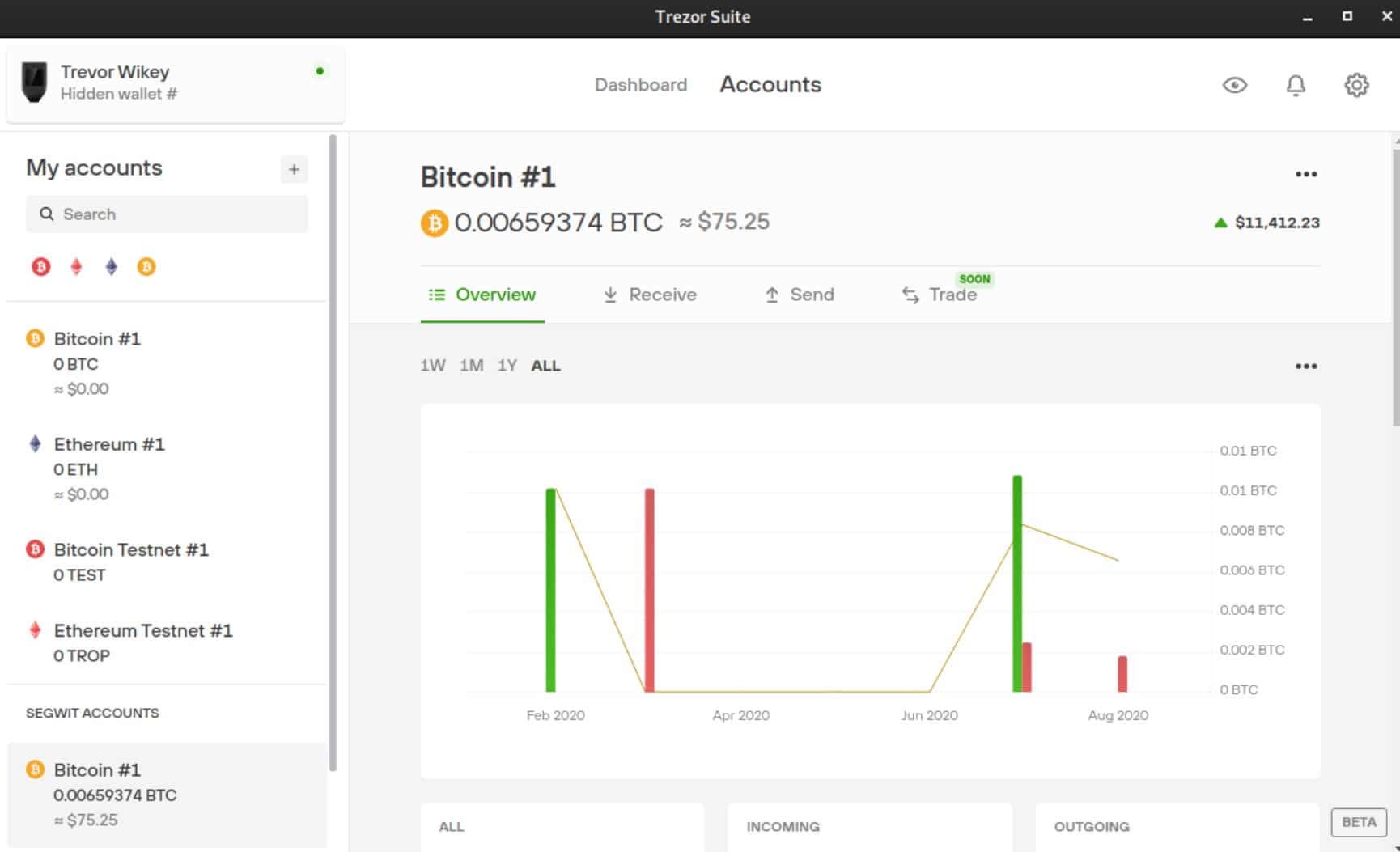
Trezor can also be integrated with web 3.0 wallets such as Metamask and has also formed a unique partnership and integration with the massively popular software wallet Exodus, combining the convenient features and the user interface of the Exodus software wallet with the security of the Trezor hardware wallet. You can read more about that in our Exodus Wallet Review.
Trezor offers two hardware wallets, the less robust and cheaper Trezor one and of course the flagship Model T. One of the most obvious benefits of the Model T over the Model One is that you have more coin support, and sensitive information such as the pin code and recovery phrases are entered directly on the Model T’s touch screen keeping all sensitive information off the computer, unlike the Trezor One.
A full list of coins supported by both the Trezor one and Trezor Model T can be found on the Trezor Asset Support page.
- Price: $280 (€249)
- Coins supported: 1,000+ Full list
Another great benefit of the Trezor Model T over the model one device is that it has a user-friendly colour touch screen. I found this to be way more efficient than having to shuffle with the buttons on both the Model One device as well as the ledgers. Trezor is compatible with the major computer operating systems: Windows, Mac, Linux, and works with Android for mobile. Apple’s IOS and Windows mobile operating systems, as well as the Chrome OS are not yet supported.

Setting up the Model T is also pretty quick and very user-friendly. All you will need to do is install the bridge and ensure that the firmware is up to date and that should be it. While the Model T is the premium device offered by Trezor, many users do not feel that it is worth more than double the price of the Trezor One.
While both are fantastic options for crypto storage offering top-level security, if you don’t need the additional asset support and don’t mind not having a touchscreen, then picking up the Trezor one for $65 is a cheaper and surefire way to ensure your funds are safe. Trezor is also highly respected and trusted as all the code for the Trezor wallets has been released and is completely open source.
We have an article where we break down the two Trezor wallets to help you decide which Trezor is right for you.
2. Best Crypto Hardware Wallet: Ledger Nano X
The number two spot on our podium goes to Ledger’s Nano X. For those that don’t know, Ledger is a company that is based in France and they are considered the standard in the hardware wallet market. When it comes to hardware wallet manufacturers, Trezor and Ledger are certainly the creams of the crop. The Ledger Nano X is the premier product in the Ledger stable and is more expensive than the entry-level Nano S.
The Nano X stores over 1,800 different cryptocurrencies and comes equipped with industry-leading security, including a CC EAL5+ Certified secure element chip. The ledger device can connect with a desktop computer through a USB cable, as well as desktop or mobile via a Bluetooth connection. Ledger can run on Windows, Mac, Linux, IOS and Android.
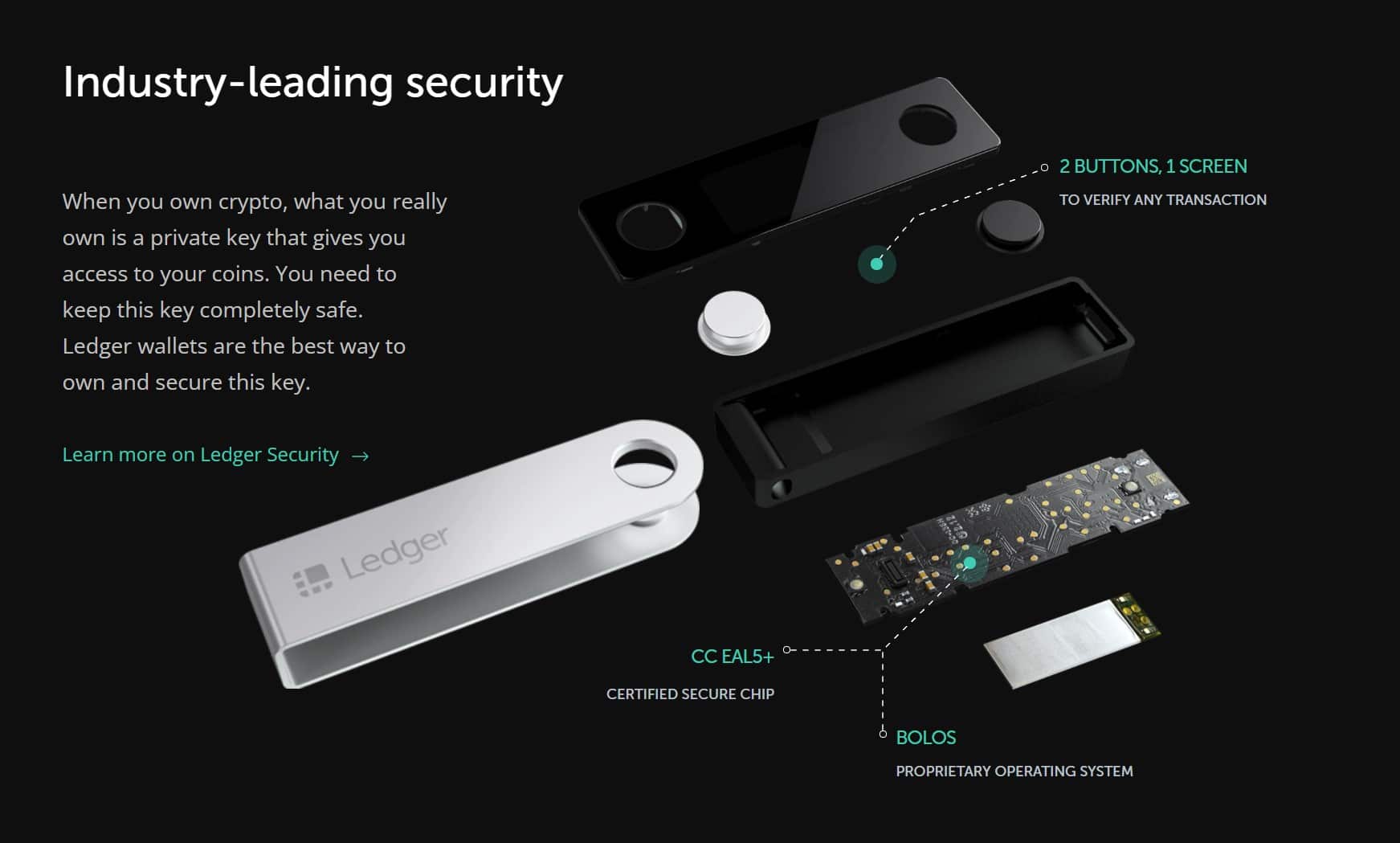
Although most of the crypto can be managed through the use of the Ledger Live software, there are many assets that have native wallets not supported with the software yet. However, given the popularity of the Ledger hardware devices, many of them have integrated with Ledger in order to allow users to securely store their keys.
While the Nano X is more expensive, it has everything that the Nano S has, while also coming with Bluetooth connectivity, a slightly larger screen and the ability to store 100 apps, as opposed to the three to six apps available on the Nano S which has been reported as a major pain point for many users as they feel there is not enough space to install enough apps to support multiple different networks leaving users unable to hold all their favourite coins.
Both Ledger Nanos also support integration with web 3 wallets such as Metamask, allowing users to access various DeFi platforms.
- Price: $119
- Coins supported: 1,800+ Full list can be found on the Ledger Coin Support page.
For crypto users without the need for 100 apps, or the need to store multiple different Altcoins, the Ledger Nano S may be a better solution for a price that is easier on the bank account ($59/£43/€50). Ledger also recently released the Ledger Nano S Plus, a fantastic upgrade from the original Nano S, instantly becoming my favourite Ledger product. There’s not much separating the different Ledger devices and most people would probably be more than happy with the cheaper Nano S or S Plus. The Nano S Plus is my pick for the cheapest hardware wallet from a highly respectable manufacturer. However, no matter which Ledger wallet is selected, there is no doubt Ledger deserves one of the top spots for secure crypto storage devices.
Because we are such big fans of the Ledger here at the Coin Bureau and often preach the importance of securing your crypto with a hardware wallet, we managed to talk the folks over at Ledger into providing our community with a sweet 20% discount for using our Ledger Discount Link or using the code LedgerLive-Bureau at checkout. I used the 20% off I saved to buy more crypto 😉
Guy even put together a handy Ledger Setup Guide, which you can find below:
It is important to let you know that Ledger did suffer a data breach in mid-2020 resulting in 272,000 customers’ home addresses, telephone numbers, names and about one million email addresses being stolen by hackers. While the crypto-assets themselves were not at risk, this breach did lead to fake emails being sent out by hackers pretending to be Ledger staff asking for users’ private keys and recovery phrases.
This data breach and lack of due diligence being done on behalf of the Ledger team has left a lot of customers to lose confidence in the security and reputation of the Ledger product and the company. If you want more information regarding the Ledger hack, Guy made a dedicated video on the Ledger hack, and more information about the breach can be found in the Ledger Blog.
Be sure to check out our dedicated article on the Ledger Nano X Review if you feel this may be the one for you.
3. Best Crypto Hardware Wallet: NGRAVE ZERO
The NGRAVE ZERO is a very promising and interesting newcomer in the hardware wallet space, boasting to be the most secure crypto wallet ever made, and we can't argue with them there as they back up that impressive claim. This next-generation hardware crypto wallet has already gained a lot of attention from crypto users and investors such as Woodstock Fund, Morning Star Ventures, DFG Group and more.
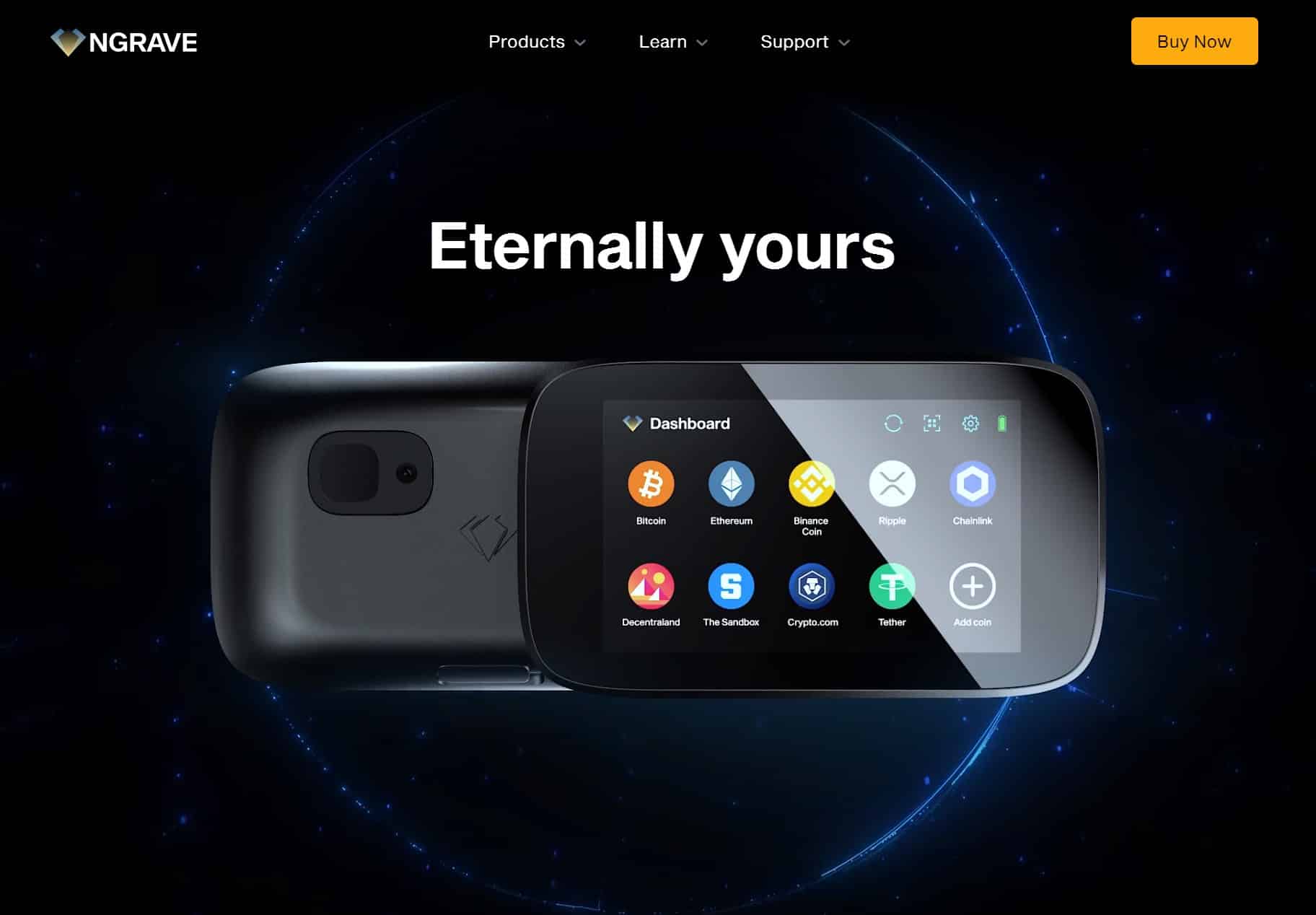
What makes this wallet so secure is that it is 100% air-gapped, and is the only crypto wallet in the world that reaches the highest security certification standard possible, EAL7 (vs Ledger's EAL5), and is also ROHS and CE certified like the Trezor, achieving a higher security standard than any of the competition. This fancy piece of kit also has a light sensor, biometric scanners, pin protection, and is tamper-proof, resulting in a wallet that is more secure from a tech perspective than any other hardware wallet.
While you would think a hardware wallet with such comprehensive and advanced security features would not be very user-friendly, the NGRAVE team have actually done an incredible job with the UX/UI of the device, and I actually found it more user-friendly than either my Trezor or Ledger. Another thing I really enjoy about the ZERO is that it is made from military-grade premium materials with a metal case, making it far more robust than the plastic hardware wallets on the market today.
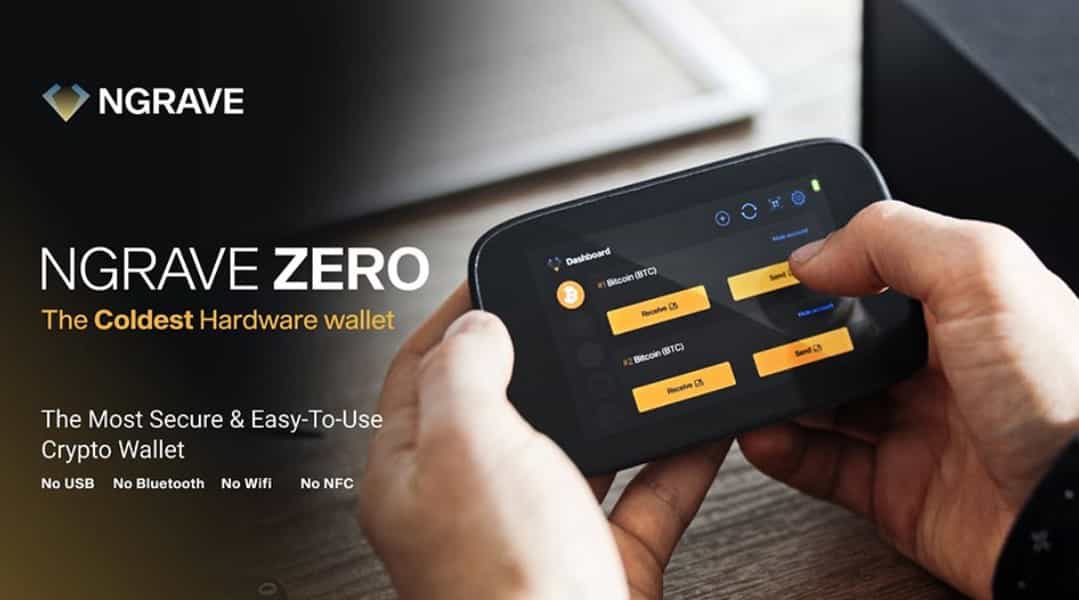
While this is the most secure crypto wallet available, the ZERO actually does something even more impressive than just state-of-the-art security and a brilliant user experience. The NGRAVE team have worked in close collaboration with a world-leading institution in nanotechnology, the Interuniversity Microelectronics Centre (IMEC), along with a research group for applied cryptography, The Computer Security and Industrial Cryptography (COSIC) to ensure high-security standards, but is was their work with Jean-Jacques Quisquater that really turned heads.
Jean-Jacques is one of the most well-respected cryptographers in history. He was actually cited as the #2 reference in Satoshi's original Bitcoin Whitepaper and teaches as a professor of cryptography. Jean-Jacques, along with the NGRAVE team have created something truly revolutionary in private key generation, recovery, and security, and created what they refer to as the “Perfect Key”. The Perfect Key along with the NGRAVE GRAPHENE make up the first ever recoverable recovery phrase without exposure to third-party risk, and is the only wallet in the world that avoids recovery phrase interception risk from third parties or wallet manufacturers.
There is way too much to unpack in this article about all the features the NGRAVE ZERO, which is why we have done up this dedicated deep-dive NGRAVE review for you to check out. I definitely recommend having a look as this very well could be the next generation of crypto storage and the “perfect key” really is a breakthrough in recovery phrase recovery and cryptography. The only thing stopping the ZERO from being higher on the list is the simple fact that it has not been battle-tested and withstood the test of time like the Trezor and Ledger, and not all the features have been rolled out yet.
Here at the Coin Bureau, after getting our hands on the NGRAVE ZERO and using it ourselves for a while, we have become so impressed with this device that we swung a deal with the NGRAVE team to give our community a 10% discount if they check out with the code “COINBUREAU” or purchase through our NGRAVE link. Nice!
4. Best Hardware Wallet: KeepKey
Coming in fourth on our list is the KeepKey hardware wallet. You can’t fault KeepKey on price, as for less than $50 you’d struggle to find a better hardware wallet. It’s also beautifully designed and has a rugged metal case and a bigger screen than any of its rivals.
KeepKey was bought by Shapeshift back in 2017, so the wallet has full integration with the Shapeshift platform and its exchange which can be accessed directly from the KeepKey wallet. Keepkey only has the option of generating a 12-word recovery phrase, and users manage their funds via the Shapeshift Platform when the device is plugged into a computer via USB.
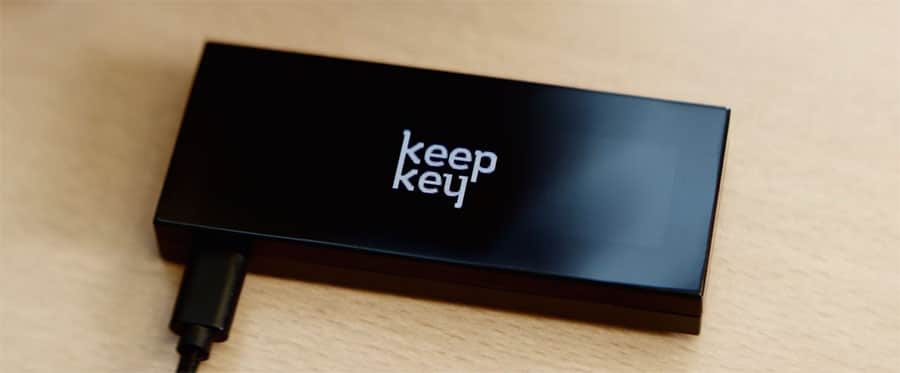
KeepKey’s security was compromised when rivals Ledger found a way to extract pin codes from the wallet, although this required having physical possession of it. The glitch was later fixed in an update.
- Price: $49
- Coins supported: Around 40+. Full list can be found on the Keepkey Supported Assets page.
The main drawback with KeepKey is its relative paucity of coin support in relation to the other wallets on this list. The Keepkey wallet also lacks integration to many web 3 wallets such as Metamask leaving users unable to interact with many DeFi apps.
Keepkey natively supports Bitcoin, Bitcoin Cash, Bitcoin Gold, Dash, Dogecoin, Ethereum, Kyber Network, Litecoin and DigiByte and can be paired with MyEtherWallet to allow support for any ERC-20 token. This is still a pretty limited list in comparison to its rivals and could well prove unsuited to anyone holding a particularly diverse portfolio.
5. Best Hardware Wallet: ELLIPAL Titan
The final spot on our list goes to the air gap crypto wallet, ELLIPAL Titan. The Titan is a cold storage wallet that works in complete network isolation for true offline cold storage. The ELLIPAL Titan comes in at a cost of $169, more than the entry-level Trezor One and Ledger Nano S, but the hefty price tag may be worth the cost for some crypto users.
This hardware wallet has the most extensive coin support on this list and is sealed to ensure that it is dust and water-proof, also coming with an anti-tamper feature that will delete all of the private keys should someone try and physically break into the device to tamper with it. The device itself is secured via a passcode, so users should be sure to use a strong passcode with this device and store the Titan someplace safe as you would with any hardware wallet.
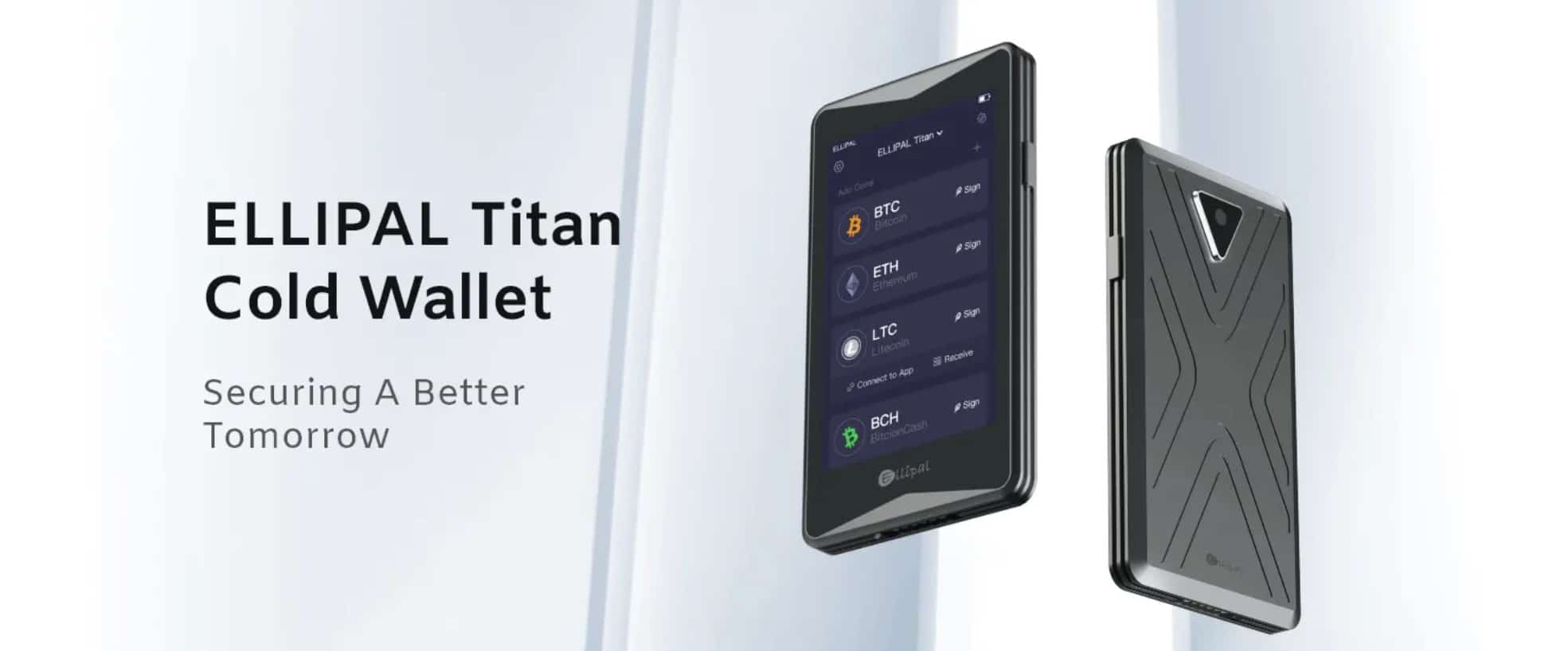
The ELLIPAL Titan is the only wallet on this list that is kept completely separated from network connectivity, with enhanced security in the form of only relying on QR codes to transfer data. The ELLIPAL cannot be connected to any connections such as USB, Wifi or Bluetooth, protecting your crypto against remote and network attacks.
ELLIPAL impressively supports a mind-blowing 46 different blockchains and 10,000+ crypto assets with new coins added each month, and even allows users to stake assets, earn interest and even buy or exchange crypto through the apps that can be installed on the wallet. ELLIPAL hardware wallet can be used in conjunction with the ELLIPAL mobile app which is available on both IOS and Android.
- Price: $169
- Coins Supported: 46 Blockchains, 10,000+ coins and tokens. Full list of assets can be found on the Ellipal Coin Support page.
Some of the cons with the wallet are that the default Bitcoin address generates the BIP 44 Bitcoin address that begins with the number 3 instead of the new and widely accepted BIP 84 Bitcoin addresses that begins with bc, which could lead to more expensive Bitcoin transactions for users.
Another deal-breaker for many users is that the Ellipal wallet does not give users access to their own Xpub keys which leaves this wallet not operable with many apps and does not give users the option to import “view only” wallets. Various crypto payment gateways for eCommerce use Xpubs to generate new payment addresses for various checkouts, so this limitation of the wallet should be considered.

Security-minded users may be turned off by the Ellipal’s ability to only generate a 12-word seed phrase instead of a more secure 24- word phrase, though a 24-word phrase can be imported. The wallet has no support for testnet coins for any blockchain network, the lack of ability to add a custom RPC could be a deal-breaker for users who are interested in running test nets or testing coins to learn how certain networks function.
After using this wallet myself for a few months I do need to say that the Titan has become a permanent member of my hardware family purely for the ease of Web3 and DApp access. I cover this in more detail in our ELLIPAL Titan Review, but the best thing about the Titan is it has the DApp functionality, access and convenience of a software wallet, but the high security of a hardware wallet. Accessing DeFi on the Titan is easier than I have found with any other hardware wallet.
Thanks to the Titan, all the funds I used to keep in software wallets for staking and using DeFi protocols like Aave, Compound, Uniswap, Trader Joe and DODO I now access easily on the Titan, and I sleep far better at night knowing my funds are more secure on the Titan than they were in my software wallets. I was so impressed with the Titan that we convinced the folks over at ELLIPAL to provide Coin Bureau readers with a 10% discount if they use our ELLIPAL Link in case they wanted to pick this little gem up for themselves.

Cryptocurrency Hardware Wallets FAQs:
What is a Cryptocurrency Wallet?
A crypto wallet is a digital or hardware wallet that allows users to store the unique digital codes needed to send and receive crypto assets such as Bitcoin, Ethereum, etc. Most wallets will allow you to hold assets for multiple chains, for example, a single Trezor can hold Bitcoin, Ethereum, Litecoin, Cardano, XRP, and more, regardless of the fact that they all run on different networks. There are some wallets that are specific for one coin or network though such as Bitcoin wallets, Monero wallets and MetaMask, which by default, is an Ethereum only wallet (for all ERC20) tokens, though other networks can be added manually to it.
A very common misconception is that wallets hold your crypto. That is a simplified way of thinking about it, but a mind-blowing fact that very few people know is that no wallet in existence actually stores any cryptocurrency at all! Crypto never leaves its blockchain network, Bitcoin will forever live on the Bitcoin blockchain network, it will never live or be stored physically inside of a crypto wallet. A crypto wallet simply acts as the keys that hold the special digital codes (private keys) needed to access your crypto that is stored on the blockchain… Crazy, I know. You can learn more about cryptocurrency wallets in our How Hardware Wallets Work article.
What are the Types of Cryptocurrency Wallets?
There are software wallets also referred to as hot wallets, which can live on a device such as a computer or mobile phone, and paper wallets, which are, as they sound, a piece of paper where private keys are written down or a QR code is printed. Then, of course, hardware wallets which were covered in this article, are the safest crypto wallet as they are not kept online like software wallets and are not as fragile as paper wallets.
When you hear the terms cold wallet and hot wallet, cold simply refers to being on a device with no online connectivity. The key takeaway when comparing a crypto hard wallet vs soft wallet is that hardware wallets have no remote attack surfaces as they are not connected to the internet, making them more secure.
With the popularity of NFTs on the rise, many digital asset holders are searching for the best wallets for NFTs, and there is no single answer here, as it will depend on what network the NFTs are on. Our pick for the best wallet for NFTs on mobile is the Trust Wallet or Coinbase wallet, as they can handle NFTs on multiple chains. Users looking for the best NFT wallet with utility could consider MetaMask, and Enjin also offers a popular NFT wallet for experienced users into web3 gaming.
What is the Best Multi-Cryptocurrency Wallet?
The best multi-cryptocurrency wallet or best altcoin wallet really comes down to personal preference and coin support. The best wallet in the world is no good if it doesn't support your favourite coin. For those looking to save a few bucks and want the safest crypto wallet for altcoins, the Trezor One is our pick. If you don't mind splashing out, then the Trezor Model T is a great choice, though Ledger products are also very good.
For software wallets, I have to say the Exodus wallet is one of the best for mobile and computer. Their UI is stunning, and they have the most robust and full-featured software wallet on the market. The Exodus wallet is also able to integrate with Trezor, taking security to the next level. From within the wallet, users can access an NFT marketplace, exchange crypto, and utilize a web3 wallet. I definitely recommend checking out our Exodus review.
Some wallets only hold a single asset, such as Bitcoin Wallets are quite popular, you can learn more about those in our Bitcoin Wallet review, while the best multi-cryptocurrency wallets are often considered the ones on this list for hardware wallets, or popular wallets like Exodus, Trust Wallet, or the Coinbase wallet are also very popular.
How to get a Crypto Wallet?
It is always best to purchase a hardware wallet directly on the company website for reasons we discussed in this article, and never buy second-hand hardware wallets due to a high risk of theft of funds.
For software wallets, always download directly from the company website, or use the website to link directly to the Google Play or Apple App Store. The reason we do not suggest searching the app stores manually is that there are often multiple fake wallets mimicking the company wallet set up by hackers. As soon as you download the fake wallet that looks just like the real wallet, poof, the hackers steal your funds.
Top Bitcoin Wallet?
All the mentions on this list can store Bitcoin and other coins. I would still say Trezor and Ledger are the safest bets as the best Bitcoin wallets, but if you are looking for Bitcoin-specific wallets or a Bitcoin hardware wallet, you may want to check out our bitcoin wallet reviews: Top Bitcoin Wallets and Top Bitcoin Wallets for Android.
We often get asked, “what's the best Bitcoin wallet?” and our pick for the best Bitcoin cold wallets generally coincides with which the best rated hardware wallets are in terms of security. For that reason, we often recommend wallets that have been battle-tested and proven secure, making our pick for the best bitcoin wallet, the Trezor or Ledger.
What is an Air Gap Crypto Wallet?
The term “air gap” simply means the wallet has no online connectivity and therefore has no attack surfaces that can be exploited remotely by hackers. The terms air-gapped and cold storage are often used synonymously, simply referring to the device having no network connection. Many of these devices will be charged via USB connection, without the charging connector point having access to the private keys of the wallet.
Keep it Secret, Keep it Safe
It is worth mentioning that Trezor and Ledger have both been industry leaders for many years, being tried and tested, passing multiple security audits and have set the bar for cold wallet security. That does not necessarily mean that their security is superior, or even that the products are better, after all, we see old tech get surpassed by new and better tech all the time, think no further than the iPod replacing the Discman cd player, but many users find the successful long-standing track record and the strong reputation of these wallets comforting.
The other mentions on this list do not yet stand up to the reputation of these two industry leaders, and have not been around as long, so be sure that you are confident in the security of the wallet that you choose and do your own thorough research before deciding to trust your funds to any crypto wallet.
Whichever wallet you choose, you still need to mitigate against the risk of it falling into the wrong hands. All wallets have pin codes, as well as seed words and phrases used for access and recovery. It goes without saying that these should be known only to you.
Write them down and keep them somewhere safe, away from prying eyes. Some people with large portfolios take their security extremely seriously. Guy, for example, keeps his wallet in one safe deposit box and his seed words in another, both in separate locations.

Technology can keep us safe only up to a point. If someone manages to get hold of both you and your hardware wallet, then there’s not much that can be done to then stop them forcing you to hand over your pin code or seed words with the aid of a weapon and some threatening gestures (a $5 wrench attack if you want the technical term).
There are two steps you can take to reduce this risk though. One is a hidden wallet feature that enables you to set up extra wallets on your device which only you know about. Both Ledger, Trezor and SecuX offer this, though it’s a bit on the fiddly side.
And the other? This step is the simplest of them all: keep your crypto on the QT and don’t go flashing your shiny new wallet about. After all, do you really want anyone knowing how much XRP you loaded up on back in the day?


